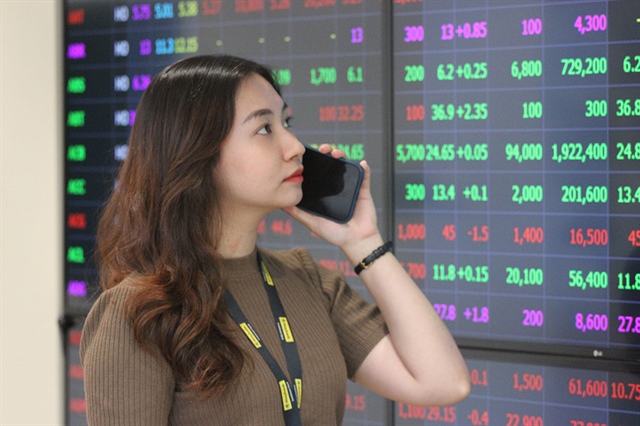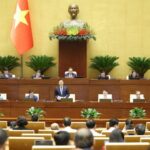In the context of the Vietnamese stock market, there are still risks from external factors as well as internal challenges such as lower-than-expected corporate revenue and growth prospects, and approaching maturity of corporate bond payments. Investors are placing higher expectations on profits to attract them to take risks with their capital.
We had a conversation with Mr. Andy Ho, Director of the Investment Council of VinaCapital Group, about the prospects of the stock market and some considerations for investors in this challenging year.
As a businessman, how do you evaluate the business environment and business culture in Vietnam compared to other countries?
Mr. Andy Ho: Vietnam has a friendly business and investment environment. Vietnam’s orientation is very consistent, focusing on policy reform, capital market development, and measures to maintain sustainable economic growth. This stability is beneficial to domestic businesses, supporting the process of equitizing state-owned enterprises, improving corporate governance standards, and creating many investment opportunities for domestic and foreign investors.
Although there are many potentials, the reality is that investors pouring capital into a developing market like Vietnam still face many challenges. We see one of the biggest challenges that investors often encounter is determining the feasibility of the business plans presented by the company’s management board, thereby obtaining appropriate valuations and terms for both the investor and the recipient.
To maintain long-term attractiveness, investors need to receive returns commensurate with the high risks of a developing market.

Mr. Andy Ho, Director of the Investment Council of VinaCapital. |
As an investment destination, what advantages does Vietnam have compared to other countries?
Foreign investors are all highly interested in the prospects of Vietnam in the coming years. They highly appreciate the stability of Vietnam’s economy, politics, and society, the increasing income and consumer demand of its 100 million people, the ability to attract foreign investment as multinational corporations are implementing the China +1 strategy, and the potential upgrade of the Vietnamese stock market from a frontier market to an emerging market in the future.
Last year, Vietnam recorded a GDP growth of 5.1% despite many difficulties in the economy.
In the next 10 years, we believe that the profitability of businesses will continue to grow at a rate of 15-25% per year, accompanying with an economic growth rate of 6-7% per year in the medium and long term. In addition, Vietnam actively controls inflation at a rate of 2-4% per year, stabilizes the VND exchange rate against USD. These macro factors will have a positive impact on investors in the medium and long term.
From your experience and VinaCapital’s experience, how can investors overcome difficulties in the Vietnamese stock market and capital market?
Accompanying the Vietnamese stock market for the past 20 years, we have witnessed the increasing professionalism, systematization, and transparency of the stock market. We always believe that the development of businesses must go hand in hand with the country’s prosperity, which always encourages us to actively play the role of a bridge between Vietnam and international investors, introducing attractive investment opportunities in this market, building a good image of the country, and attracting high-quality FDI to strategic sectors of the economy.
In addition, we diversify investment fields to contribute to minimize the negative impact on the environment of traditional energy sources, invest in innovative technological ideas that can create completely new markets, bring more value to the Vietnamese economy, and social welfare in the context of the new digital economy.
This year, VinaCapital expects interest rates to stabilize and investors will focus on profit growth and stock valuation. This will support the increase in stock prices this year. Specifically, we expect the profits of listed companies to recover from no growth in 2023 to a growth rate of 10-15% in 2024 and over 20% in 2025, and our forecast is more cautious than the market consensus at this time.
In addition, the cheap valuation of the market and other supporting factors will drive the market up in early 2024. With the above profit growth rate, the P/E of the VN-Index will be at a level of about 10 times for 2024, about 26% lower than the valuation level of ASEAN-5 countries (Singapore, Malaysia, Indonesia, Philippines, and Thailand).
From the perspective of foreign investors, what do they expect in the Vietnamese stock market and capital market?
As mentioned, foreign investors have high expectations for Vietnam’s long-term development potential. Factors such as economic-political-social stability, open nature of the economy, along with encouraging policies and investment attraction of Vietnam are catalysts for investors to choose Vietnam over other markets. The potential upgrade of the Vietnamese stock market from a frontier market to an emerging market is also an attractive factor.
Regarding the upgrading, the State Securities Commission, along with relevant agencies and securities companies, are making efforts to put the KRX trading system into operation soon and remove the requirement for institutional investors to deposit 100% of the fund before trading stocks. If the Vietnamese stock market is upgraded, we estimate that the proportion of Vietnamese stocks will account for about 0.7% to 1.2% in the MSCI and FTSE Russell’s new market index basket, and foreign capital inflows into the Vietnamese stock market could reach 5-8 billion US dollars.
Do you have any advice for foreign investors when participating in the Vietnamese market?
Investors should have a systematic and disciplined investment strategy based on fundamental analysis of each stock, avoiding buying stocks without fundamental foundations or overpriced stocks; using financial leverage with caution. For investors who do not have enough time and knowledge to invest on their own, they can consider buying open-end funds to minimize risks.
Thank you!
Van Phong





































